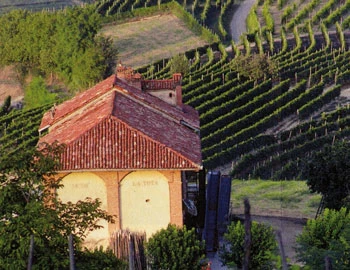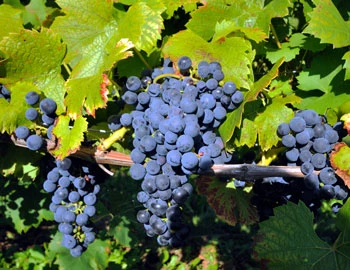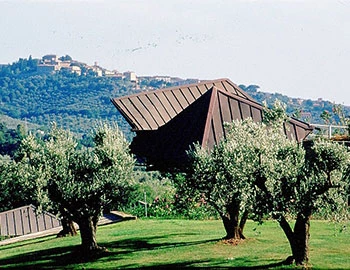Sostegno 2022
DOC Piemont, Marchesi Alfieri, 750 ml

| Grape variety: | Barbera, Pinot noir |
| Producer: | Marchesi Alfieri |
| Origin: | Italy / Piemont / Monferrato |
Description
The Sostegno is a beautiful liaison of Barbera and Pinot Nero. The scent reminds of the red fruits of the Barbera and merges with the spiciness of the Pinot Nero. It is intense, but not heavy. Elegant and noble, so are the finely polished tannins for which Alfieris are known. The barrique discreetly accompanies the fruity aromas, making it a very drinkable cuvée that is ideally suited as a sophisticated "Vino della Casa"!
Attributes
| Origin: | Italy / Piemont / Monferrato |
| Grape variety: | Barbera, Pinot noir |
| Label: | Vegan |
| Ripening potential: | 2 to 5 years |
| Drinking temperature: | 16 to 18 °C |
| Food Pairing: | Penne con pesto, Spaghetti con sugo al basilico, Spaghetti alla bolognese, Italian antipasti |
| Vinification: | cooling period, fermentation in steel tank |
| Maturation: | in steel tank |
| Maturation duration: | 10 months |
| Volume: | 13.0 % |
| Note: | Contains sulphites |
Marchesi Alfieri
At the intersection of Roero, Langhe and Monforte, between Asti and Alba, lies the small medieval village of San Martino Alfieri. The magnificent baroque castle of the Marchesi Alfieri and the Azienda building are located on the hill.
The winery is run by three sisters, Emanuela, Antonella and Giovanna San Martino di San Germano, direct descendants of the Marchesi Alfieri. The winemaker Mario Olivero has been at their side for many years.
The Alfieri have been living here since 1616, and have been closely connected with the Piedmont region and its history since. They have asserted their influence honourably in literature, architecture and politics. The magnificent chambers, halls and the romantic orangery speak of an eventful family history at every turn. The huge park is a feast for the eyes and quickens the heart of any botanist or gardener.

Pinot noir
Blueprint of the terroir
No other variety expresses its terroir as precisely as Pinot noir. It is a sensitive, fragile grape. But when it succeeds, it gives the world some of its very greatest wine plants. It especially excels in Burgundy, where it has been cultivated for at least 700 years. Even in the middle ages, it was considered so precious that it was kept separate from other grapes so as to not diminish its value. The finest examples are delicate and fragrant with aromas of cherries and red berries. With maturity, notes of forest floor, leather and truffles enter as well. An irresistible fruity sweetness still shines through, even after several decades. The Pinot noir does well in cool locations: in Switzerland and in Germany, where it is known as Blauburgunder and Spätburgunder respectively; in Alsace and in South Tyrol, in Oregon, New Zealand and Tasmania. Not least, it yields fantastic champagnes. It is a wonderful culinary companion. With its soft tannins and charming bouquet, it meshes with everything, from Güggeli and cheeses to fried fish.

Italy
Italy – Where wine is a way of life
The Italian wine regions are extremely diverse, and this is made clear in their wines. Established varieties such as Merlot, Syrah, and Sauvignon can be found on just 15 percent of the total vine growing area. The remaining 85 percent is reserved for autochthonous, indigenous varieties. More than 2,000 different grape varieties are grown under diverse conditions and pressed with various techniques into wines that reach the top tier of the international wine market.



